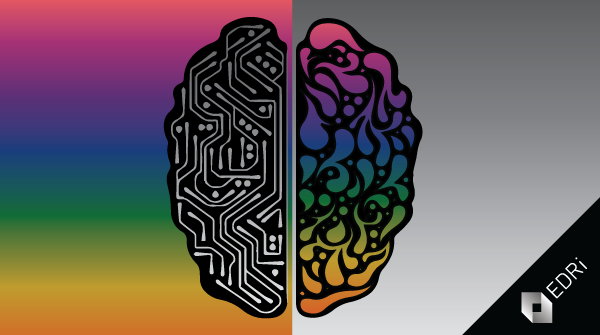Why tech is not “just a tool”
Throughout October 2019, digital rights-watchers welcomed new reports warning about the human rights crises of Artificial Intelligence (AI) and other digital technologies. From Philip Alston’s caution that the UK risks “stumbling zombie-like into a digital welfare dystopia” to David Kaye’s critique of internet companies’ and States’ failure to respect human rights online, civil society is increasingly demanding greater insight into the impact of technology on society. Individuals who do not work on “digital rights” are also becoming progressively more aware of the exponentially increasing power and control of technology giants such as Facebook and Google.

Whilst every citizen is and will continue to be affected (whether positively or negatively) by the rise of technology for everyday services, the risks are becoming more evident for some of the groups that already suffer systematic discrimination. Take this woman who was automatically barred from entering her gym because the system did not recognise that she could be both a doctor, and a woman; or this evidence that people of colour get worse medical treatment when decisions are made by algorithms. Not to mention the environmental and human impact of mining precious metals for smartphones (which disproportionately impacts the global south) and the incredibly high emissions released by training just one single algorithm. The list, sadly, goes on and on.
The idea that human beings are biased is hardly a surprise. Most of us make “implicit associations”, unconscious assumptions and stereotypes about the things and the people that we see in the world. According to some scientists, there are evolutionary reasons for this, in order to allow our ancestors to distinguish between friends and foes. These biases, however, become problematic when they lead to unfair or discriminatory treatment – certain groups being surveilled more closely, censored more frequently, or punished more harshly. In the context of human rights in the online environment, this matters because everyone has a right to equal access to privacy, to free speech, and to justice.
States are the actors that are responsible for respecting and protecting their citizens’ human rights. Typically, representatives of a state (such as social workers, judges, police and parole officers) are responsible for making decisions that can impact citizens’ rights: working out the amount of benefits that a person will receive, deciding on the length of a prison sentence, or making a prediction about the likelihood of them re-offending. Increasingly, however, these decisions are starting to be made by algorithms.
Many well-meaning people have fallen into the trap of thinking that tech, with its structured 1s and 0s, removes humans’ messy bias, and allows us to make better, fairer decisions. Yet technology is made by humans, and we unconsciously build our world views into the technology that we produce. This encodes and amplifies underlying biases, whilst outwardly giving the appearance of being “neutral”. Even the data that is used to train algorithms or to make decisions reflects a particular social history. And if that history is racist, or sexist, or ableist? You guessed it: this past discrimination will continue to impact the decisions that are made today.
The decisions made by social workers, police and judges are, of course, frequently difficult, imperfect, and susceptible to human bias too. But they are made by state representatives with an awareness of the social context of their decision, and crucially, an ability to be challenged by the impacted citizen – and overturned if an appropriate authority feels they have judged incorrectly. Humans also have a nifty way of being able to learn from mistakes so that they do not repeat them in the future. Machines making these decisions do not “learn” in the same way as humans: they “learn” to get more precise with their bias, and they lack the self-awareness to know that it leads to discrimination. To make things worse, many algorithms that are used for public services are currently protected under intellectual property laws. This means that citizens do not have a route to challenge decisions that an algorithm has made about them. Recent cases such as Loomis v. Wisconsin, which saw a citizen challenge a prison sentence determined by the US’s COMPAS algorithm, have worryingly ruled in favour of upholding the algorithm’s proprietary protections, refusing to reveal how the sentencing decision was made.
Technology is not just a tool, but a social product. It is not intrinsically good or bad, but it is embedded with the views and biases of its makers. It uses flawed data to make assumptions about who you are, which can impact the world that you see. Another example of this is the use of highly personalised adverts in the EU, which may breach our fundamental right to privacy. Technology cannot – at least for now – make fair decisions that require judgement or assessment of human qualities. When it comes to granting or denying access to services and rights, this is even more important. Humans can be aware of their bias, work towards mitigating it, and challenge it when they see it in others. For anyone creating, buying or using algorithms, active measures about how the tech will impact social justice and human rights must be at the heart of design and use.

Hate speech online: Lessons for protecting free expression (29.10.2019)
https://edri.org/hate-speech-online-lessons-for-protecting-free-expression/
Millions of black people affected by racial bias in health-care algorithms (24.10.2019)
https://www.nature.com/articles/d41586-019-03228-6
Anatomy of an AI System
https://anatomyof.ai/
Profiling the unemployed in Poland: Social and political implications of algorithmic decision making
https://panoptykon.org/sites/default/files/leadimage-biblioteka/panoptykon_profiling_report_final.pdf
Project Implicit
https://implicit.harvard.edu/implicit/takeatest.html
Digital dystopia: how algorithms punish the poor (14.10.2019)
https://www.theguardian.com/technology/2019/oct/14/automating-poverty-algorithms-punish-poor
(Contribution by Ella Jakubowska, EDRi intern)


